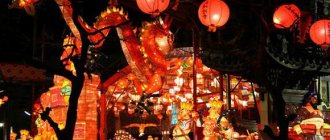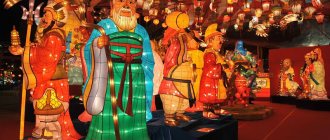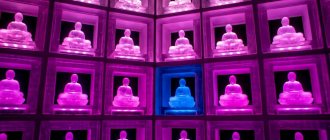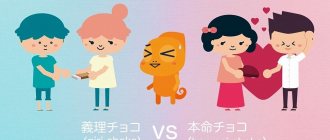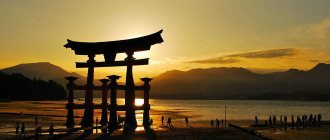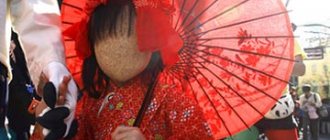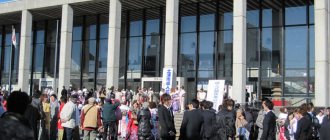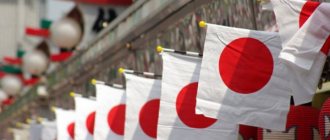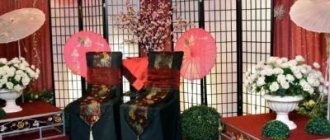In the Land of the Rising Sun, Christmas is celebrated on December 25, just like in America.
At the same time, the holiday here does not have a pronounced religious overtones. Only a small percentage of families go to Catholic churches for holiday services. Others simply enjoy the opportunity to relax, see relatives and exchange gifts. The main events take place the day before Christmas, that is, December 24th. On this day, you can see special Christmas episodes of your favorite programs on almost all television channels. They also show numerous films and cartoons dedicated to Christmas.
Local residents also associate the eve of the holiday with parades, parties, and bright fireworks. We can say that for a short period of time, all of Japan turns into one big carnival with a Christmas flavor.
History of Christmas in Japan
It all started not so long ago - in December 1904. It was then that a decorated Christmas tree was first installed at the entrance to one of the department stores in Tokyo. It is believed that it was she who started the tradition of celebrating Christmas.
However, back in the middle of the last century, December 24 and 25 were the most common days for most Japanese. But the constant rapprochement with the West and the globalization of the world have made Christmas truly popular here too.
Now local children also run to the Christmas tree in the morning to unpack gifts, and adults buy postcards and take family portraits in beautiful sweaters to then send pictures to their closest relatives.
Christmas as a colorful festival
As children, we believed that if we behaved well all year, we would receive a gift from Santa Claus on Christmas night, and on the morning of December 25 - after all, Catholic Christmas is celebrated in Japan - we were terribly happy about the long-awaited gift we found under our pillow.
How old were we when we suddenly realized that it was actually our parents who bought these gifts for us? In Japan, the festive mood is much more felt not on Christmas itself, but on Christmas Eve, on the evening of December 24th. Yamashita Tatsuro's song, which is called "Christmas Eve", has been consistently hitting the charts for 29 years in a row. There are Christmas specials on television on all channels, and a movie called “Christmas” is always broadcast. Tokyo Disneyland and Universal Studios Japan in Osaka host Christmas parades, fireworks displays and many other special events.
Unlike Christian countries, where Christmas is a state and primarily a religious holiday, in Japan the religious component of Christmas is almost invisible - this holiday is more like a colorful festival, akin to traditional Japanese o-matsuri. The celebration of Christmas in Japan is not associated with the birth of Jesus Christ and exists outside of the biblical context; only Christians attend the Christmas service.
There are about 1.9 million Christians in Japan, representing a little more than 1% of the total number of followers of various religions (according to the Japan Cultural Affairs Agency's Religion Yearbook). But everyone loves Christmas, which in modern Japan is called Kurisumasu, and not just Christians. In December 1904, a decorated Christmas tree appeared at the entrance to the Meijiya department store located in Ginza - it is believed that this event was one of the first steps towards the popularization of Kurisumasu in Japan. Nowadays, with the arrival of December, many people put up Christmas trees in their homes, festive garlands of light bulbs are lit everywhere, and stores sell Christmas tree decorations and other goods for Christmas. In large cities, special Christmas illumination is organized; streets, squares and parks shine with Christmas decorations.
Girl decorates the tree for Christmas
Who do the Japanese celebrate Christmas with?
Not all people celebrate Christmas with their family. Adult children, for example, usually do not go to their parents. They prefer to go to a party or have a romantic dinner in the company of a loved one.
An important nuance to the situation is given by the fact that December 25 is a working day. That is, after celebrating Christmas Eve, you need to go to work in the morning and fulfill your duties. This makes you think several times before getting involved in any adventure.
Story
Japanese Christmas card from 1914.
Christmas Eve 1967 in Tokyo's Tomizaka Church with dressing up as shepherds - heroes of the gospel story - and as sheep. The first recorded public Christmas Christian service in Japan was held in 1552 by Portuguese Jesuit missionaries in Yamaguchi Prefecture. Some believe that officially unrecorded celebrations were held before this date, starting in 1549, when St. Francis Xavier landed on Japanese soil. This historical fact came into focus in 1991 when St. Xavier's in Yamaguchi was destroyed by fire and rebuilt by 1998, in honor of which a festival was held at Christmas 1997, which has since become traditional. In 1999, spruce trees were planted near the river as a symbol of the birthplace of Japanese Christmas. Since December 2009, the city of Yamaguchi received a second, English, name “Christmas City” (Christmas City).
In 1612, Christianity was banned throughout Japan for political reasons. However, a small enclave of Kakure Kirishitan ("secret Christians") continued to hold clandestine Christmas services for the next 250 years until Christianity was again legalized. The persecution did not apply to the Dutch, and they celebrated Christmas in their circles in their places of residence: in the Urakami area in the north of Nagasaki, and on the small island of Dejima, where local residents dubbed it the “Dutch New Year”[1].
In 1854, Japan's borders opened to foreigners, and, under the influence of the United States, the Christmas holiday began to be celebrated openly. In 1860, Christmas Eve was celebrated at the residence of the Prussian envoy, and in 1873 the ban on the free practice of Christianity by the Japanese was lifted. At the end of the 19th century, the Maruzen department store introduced a new service - sales of Christmas gifts and Christmas tree decorations for tourists and foreign employees, but these sales also gained popularity among the Japanese themselves. The tradition of baking cakes and making artificial Christmas trees emerged. In the early 1920s, massive parties began to be held in Tokyo parks and at the Teikoku Hotel on December 25th[1].
After a brief ban on Christmas celebrations under threat of imprisonment in the 1930s and 1940s by the militaristic Japanese government, the tradition of celebrating Christmas again gained popularity in the 1950s and 1960s thanks to the growing economy and the influence of American television, and in the 1970s it became a widespread family celebration. with a romantic twist[1].
What happens on the streets at Christmas
Strangely enough, the spirit of Christmas can be felt best in shopping districts. Boutique employees decorate their windows and display elegant Christmas trees. This is done not only out of love for the holiday, but out of a desire to attract customers and increase profits. But everything looks very beautiful anyway.
In restaurants and cafes you can see a special Christmas menu, and some establishments hold concerts in which local pop stars take part. A ticket to such an event can cost 40-50 thousand yen.
But there are also free street shows. It's rare to see celebrities there, but that doesn't make them worse. On the contrary, the streets are full of jugglers, acrobats and other artists who can surprise the public with their performances.
Is Christmas Eve the most romantic evening of the year?
In Christian countries, Christmas is usually celebrated at home with family. And in Japan, traditionally, a family holiday is not Christmas, but New Year, O-shogatsu.
Christmas in Japan is spent either with friends or with a loved one; this holiday is associated with a fun and noisy party or a romantic one-on-one meeting. And since Christmas itself in Japan is a working day, all the fun happens the night before. This is why Christmas Eve is considered a more romantic and festive day than Christmas itself. It is not customary to give gifts at Christmas. Two exceptions to the rule: gifts from parents to young children and gift exchanges between lovers. In general, for lovers, Christmas is an important holiday, comparable to a birthday or the anniversary of an acquaintance, or even a wedding.
Every self-respecting business, even the smallest one, enters into a Christmas “trade war”, trying to win the attention of customers: special Christmas goods are displayed in store windows, restaurants have special Christmas menus, large hotels host festive evening shows with the participation of fashionable entertainers, in which you can take part for 40-50 thousand yen. Needless to say, hotels and ryokans (Japanese traditional guest houses) are packed to capacity, so if you plan to spend the night in a hotel rather than at home on Christmas, you should take care of accommodation in advance.
Marunouchi Christmas lights in Tokyo
Christmas treats
If in America the traditional Christmas dish is turkey, then in Japan chicken plays this role. Finding it in a store at least a day before the holiday is almost impossible. That's why the Japanese try to buy everything in advance. There are even special kits that, in addition to the chicken carcass, contain spices and other ingredients that will be needed during the cooking process.
People in the Land of the Rising Sun also love Kurisumasu-keki - a sponge cake decorated with a lush top of whipped cream. Strawberries are also often placed on top, and sugar figurines in the shape of Christmas trees are another popular decoration.
Notes
- ↑ 1234567891011
How to celebrate Christmas in Japan, traditions: how Christmas is celebrated in Japan - ↑ 1 2 3 4 5 6 7 Valery Ivanov
“Kurisumasu or Christmas in Japanese,” - www.ivanov-v.ru (12/15/2010) - ↑ 1 2 3 4 A. Lazarev
“Christmas in Japan. The Art of Giving" // Magazine "Japan Today", No. 12 2003 - ↑ 1 2 3 4
(English)
Shizuko Mishima
“Christmas in Japan”, Japan travel section of About.com., 27.1.2010 - ↑ 1234
Christmas in Japan - www.openjapan.ru - (English) Whipp, Lindsay
“All Japan wants for Christmas is Kentucky Fried Chicken.” Financial Times, 12/19/2010 - Orthodox Christmas in Japan, interview with priest Nikolai Dmitriev (12/25/2011)
After Christmas
As soon as Christmas ends, active preparations for the New Year begin. Shimekazari (national amulets) are replacing Christmas trees, the design of store windows is changing, and new advertising is appearing. Despite the growing popularity of Christmas, New Year in Japan is still loved more and celebrated with great fanfare.
Note: don't know what to give your girlfriend? If she is interested in sports, she will appreciate sneakers, which you can choose and purchase at https://creamstore.com.ua/krossovki. Most importantly, find out her foot size and favorite color in advance.
<Everything you wanted to know about New Year celebrations in Japan
New Year in Japan: celebration traditions>
Christmas is replaced by the O-shogatsu New Year
In Japan, it has long been customary to celebrate the New Year. The celebration lasts either a week (from the first to the seventh of January) or two (from the first to the fifteenth of January), this period is called in Japanese shogatsu (beginning of the year). Having generally celebrated Christmas, the Japanese immediately switch to “New Year’s mode” as soon as December 26 comes. Christmas trees at the doors give way to Shimekazari New Year's amulets, shop windows and shopping centers are also transformed overnight. Following New Year's Eve (Japanese: Oomisoka) comes the New Year (Japanese: O-shogatsu), and the string of seasonal holidays does not end.
Banner photo: Birthday cake topped with whipped cream and strawberries.
LiveInternetLiveInternet
Quote from Bulgakova_Tatyana's message
Read in full In your quotation book or community!
CHRISTMAS IN JAPAN
New Year decorations in Japanese style
Christmas is celebrated in Japan, but not at all in the same way as in Christian countries. Japanese Christmas is more reminiscent of Valentine's Day than the main and so expensive holiday for Christians around the world. The state religions in Japan are Buddhism and Shinto, and only a small percentage of the population professes Christianity.
Japanese style Christmas decoration
But, as you know, the Japanese are big fans of celebrations and festivals, and Christmas for the Japanese is another opportunity to have fun. But the holiday is more of a commercial nature and there is no religious meaning attached to it. The main celebration is centered around Christmas Eve.
A more important day for all Japanese is December 23, a national holiday - the birthday of the current Emperor Akihito. On this day, thousands of Japanese will gather near the Imperial Palace in Tokyo to greet their emperor and convey their sincere congratulations to him.
The Japanese will celebrate Christmas Eve with a small circle of close people. As a rule, in the evening, returning from work, the father of the family will go shopping at the store and buy “Christmas cake”, which will be the main dish on the Japanese table that evening, like “Christmas chicken”, instead of the traditional turkey in the West. Many Japanese are absolutely sure that the main Christmas dish is fried chicken, not without the participation of the American fast food chain Kentucky Fried Chicken, which launched a brilliant advertising campaign in Japan.
Japanese style Christmas decoration
All stores discount prices on “Christmas cakes” on December 25th, which has led to a funny expression in Japanese society. "The 'Christmas Pies' have reached their marriageable age, and deep discounts literally require them to get married after their twenty-fifth birthday." Many Japanese people will have a Western-style Christmas tree and Christmas gifts. Gifts are given by parents to small children who believe that they were brought by a foreign Santa. But as soon as children stop believing in the existence of the real Santa Kurosu, they do not receive gifts. Christmas Eve in Japan is date night. Young people who have decided to connect their lives in the future spend Christmas Eve in a romantic setting. To do this, they book a table in a restaurant or reserve a place in a hotel in advance, while outlining their possible fantasies to the owner of the establishment. They exchange symbolic gifts - toys, flowers, scarves, jewelry.
Decorations for the New Year in Japanese style
Adult couples often prefer to go to the theater or concert this evening. And ticket prices, I must say, are quite high these days. Although, recently there has been a noticeable tendency in Japanese stores to actively advertise many products under the “Christmas brand” several weeks before Christmas. The stores are full of wonderfully designed gifts for women and men, but especially for children!
The story of Jesus Christ being born in a manger is a favorite among Japanese girls. And the Nativity scene, in which Jesus is in the cradle, causes genuine delight. Often, they actually see a cradle for the first time, since Japanese children do not sleep in cradles.
